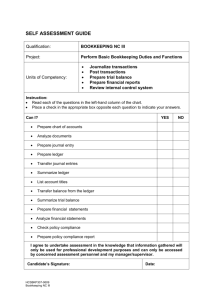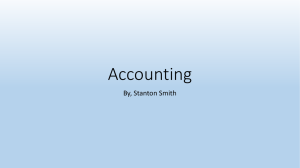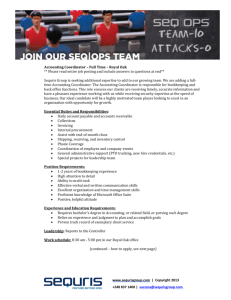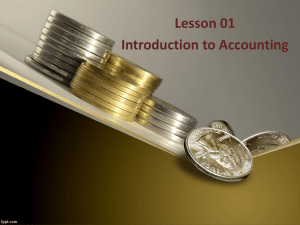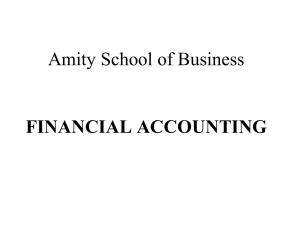Extended Studies & Workforce Education Division Norwalk Community College National Bookkeeping Certificate Program
advertisement
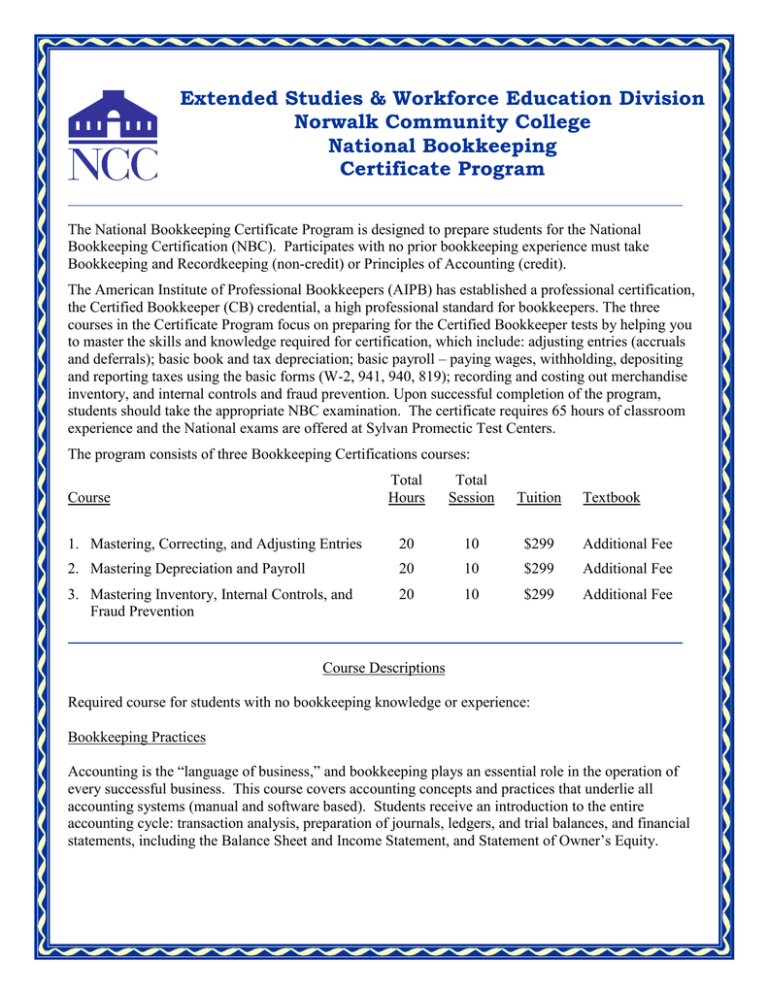
Extended Studies & Workforce Education Division Norwalk Community College National Bookkeeping Certificate Program The National Bookkeeping Certificate Program is designed to prepare students for the National Bookkeeping Certification (NBC). Participates with no prior bookkeeping experience must take Bookkeeping and Recordkeeping (non-credit) or Principles of Accounting (credit). The American Institute of Professional Bookkeepers (AIPB) has established a professional certification, the Certified Bookkeeper (CB) credential, a high professional standard for bookkeepers. The three courses in the Certificate Program focus on preparing for the Certified Bookkeeper tests by helping you to master the skills and knowledge required for certification, which include: adjusting entries (accruals and deferrals); basic book and tax depreciation; basic payroll – paying wages, withholding, depositing and reporting taxes using the basic forms (W-2, 941, 940, 819); recording and costing out merchandise inventory, and internal controls and fraud prevention. Upon successful completion of the program, students should take the appropriate NBC examination. The certificate requires 65 hours of classroom experience and the National exams are offered at Sylvan Promectic Test Centers. The program consists of three Bookkeeping Certifications courses: Total Hours Total Session Tuition 1. Mastering, Correcting, and Adjusting Entries 20 10 $299 Additional Fee 2. Mastering Depreciation and Payroll 20 10 $299 Additional Fee 3. Mastering Inventory, Internal Controls, and Fraud Prevention 20 10 $299 Additional Fee Course Textbook Course Descriptions Required course for students with no bookkeeping knowledge or experience: Bookkeeping Practices Accounting is the “language of business,” and bookkeeping plays an essential role in the operation of every successful business. This course covers accounting concepts and practices that underlie all accounting systems (manual and software based). Students receive an introduction to the entire accounting cycle: transaction analysis, preparation of journals, ledgers, and trial balances, and financial statements, including the Balance Sheet and Income Statement, and Statement of Owner’s Equity. Mastering, Correcting, and Adjusting Entries This course covers everything students need to know for error corrections, bank reconciliation, accruals and deferrals. Prerequisite: Bookkeeping Practices (non-credit), Principles of Accounting (credit), or Financial Accounting (credit), or on-thejob bookkeeping experience. Mastering Depreciation and Payroll This course covers everything students need to know about paying wages, withholding, depositing and reporting taxes, correct use of government forms, depreciation on financial statements, straight-line, GAAP, production method, etc. Prerequisite: Bookkeeping Practices (non-credit), Principles of Accounting (credit), or Financial Accounting (credit), or on-thejob bookkeeping experience. Mastering Inventory, Internal Controls, and Fraud Prevention This covers everything students need to know about accounting for inventory, inventory recordkeeping using the perpetual method, using the periodic method, and inventory costing. Prerequisite: Bookkeeping Practices (non-credit), Principles of Accounting (credit), or Financial Accounting (credit), or on-thejob bookkeeping experience. ____________________________________________________________________________________ Please refer to the current Extended Studies & Workforce Education catalog for course specifics (tuition, start date, meeting time slot, and location). Page 2 of 2
